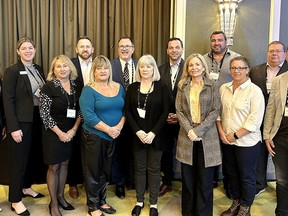
Home ownership remains out of reach for many people as interest rates, inflation and other issues affect the real estate market, a regional housing summit has heard.
Advertisement 2
Article content
Chatham-Kent Association of Realtors members joined Mayor Darrin Canniff and other area politicians at last Friday’s Western Ontario Housing Economic Summit in London, which saw expert panellists discuss a wide range of issues, a release said.
Article content
The need for more wastewater and other infrastructure spending by Ontario municipalities, particularly for emergency preparedness, was a key message.
Canniff highlighted the substantial financial commitment required.
“In Chatham-Kent, we’re facing an estimated $1.5-billion investment over the next decade just for new infrastructure and repairs,” he said in a release. “This is indicative of the hundreds of billions of dollars that will be necessary province-wide in the coming years to address wastewater challenges.”
Advertisement 3
Article content
MPP Matthew Rae (PC-Perth-Wellington) stressed the importance of proactive investment in wastewater infrastructure, particularly upgrading pumping stations to increase capacity.
“Upgrading wastewater infrastructure, such as pumping stations, is crucial for accommodating growth,” he said in the release. “Investing up front in high-quality infrastructure not only helps expedite housing construction, but also ensures resilience against the impacts of climate change, benefiting future generations.”
Canniff and Matthew cited wastewater infrastructure’s key role in sustaining communities and mitigating environmental risks and urged participants to make long-term planning and investment in wastewater systems a priority.
Advertisement 4
Article content
Association agent Carson Warrener shed light on significant shifts in Canada’s housing market.
The emergence of single-family homes as a national and global financial asset has been a historic milestone in Canadian real estate, he said.
“Recent trends have seen an influx of out-of-town speculators, accounting for up to half of our sales,” Warrener said.
“While discussing supply and demand is commonplace, it’s crucial to examine the underlying assumptions,” he added. “The identity of the end user varies, particularly in smaller communities like Chatham-Kent, where homes were historically undervalued.”
Post-pandemic price increases have pushed the average home price to $400,000, but “wage growth has not kept pace, resulting in significant affordability challenges for residents,” he said.
Advertisement 5
Article content
He highlighted a unique situation in Chatham-Kent, where some 700 serviced residential building lots remain undeveloped.
“Despite having ample supply, a third of our listings consist of new homes that have been standing vacant,” Warrener said. “In one instance, a property took 13 months to sell, fetching $160,000 below the asking price, underscoring the complex interplay between supply, affordability, and market dynamics.”
As the real estate landscape evolves, Warrener stressed the importance of addressing affordability concerns in smaller communities alongside broader supply issues.
“While the housing market grapples with supply challenges, it’s imperative to explore strategies to enhance affordability,” he said.
Article content
